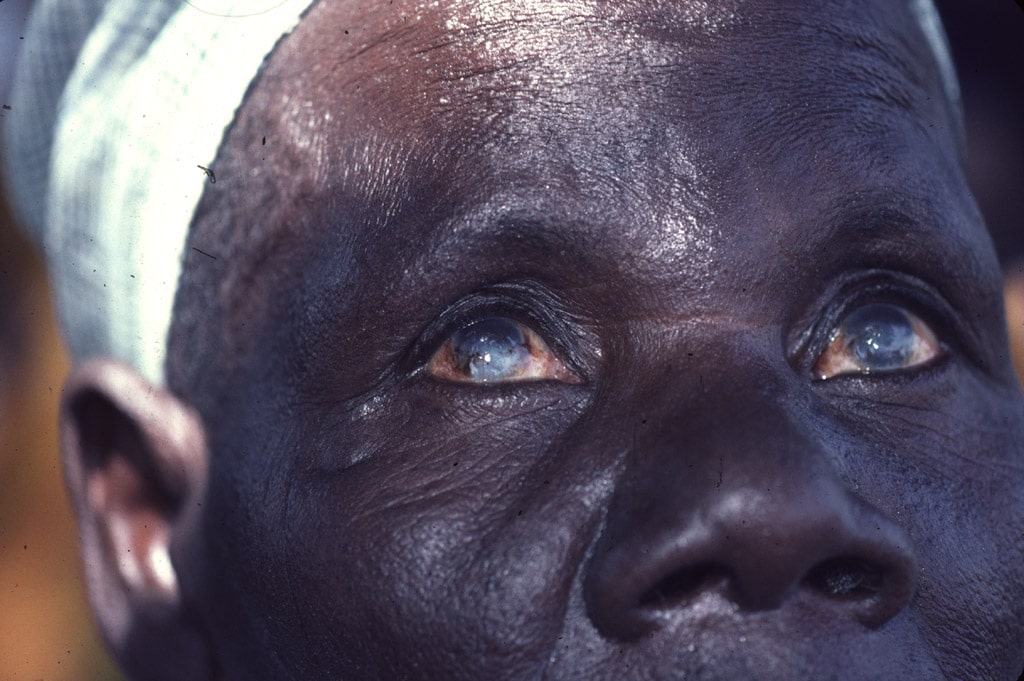Onchocerciasis is one of the five neglected tropical disease (NTD that OPC is fighting to eliminate in Francophone Africa.
Onchocerciasis is endemic in 30 African countries, including the Francophone African countries of Cameroon, Burkina Faso, Mali, Chad, and the Democratic Republic of Congo. The World Health Organization estimates that 90 million people worldwide are at risk of infection. Onchocerciasis is the second leading cause of infectious blindness worldwide, after trachoma.
Fear of contracting the disease has led many people who rely on agriculture to abandon fertile lands along rivers in these countries. Consequentially, this has lasting, negative socio-economic effects.
What is Onchocerciasis?
Onchocerciasis is a parasitic disease that is also known as river blindness. It is called river blindness because the blackfly that transmits the infection, caused by a parasitic worm (Onchocerca volvulus), lives and breeds near rivers and other fast-flowing bodies of water.
When a person is bitten by a blackfly and infected, the female adult worm produces thousands of larvae, called microfilariae, inside the body. These microfilariae move through the person’s body and when they die, they are toxic to the person’s skin and eyes. They cause irritation and damage such as itching, skin rashes, lesions, skin depigmentation and vision impairment. In the most serious cases, after many years of exposure, the infected person can become permanently blind.
The cycle of onchocerciasis infection repeats through the blackfly as the vector of transmission. When a female blackfly bites an infected person, it also ingests microfilariae which develop further in the blackfly and are then transmitted to the next person the blackfly bites, thus spreading the disease.
How is Onchocerciasis Diagnosed and Treated?
Onchocerciasis is diagnosed in two ways: with a slit lamp examination of the eye and skin biopsies which can detect the parasite in the body.
Onchocerciasis is treated with ivermectin, a drug that paralyzes and kills the microfilariae. This relieves the intense itching of the skin that is a major symptom, and it stops the disease’s progression to blindness. The drug also prevents adult worms from producing more microfilaria for a few months after treatment, which reduces the transmission of the disease.
It only takes one dose each year for the ivermectin treatment to be effective. The pharmaceutical company Merck has generously donated the drug since 1987, and works with Ministries of Health and their partners, like OPC, to distribute the drug to affected communities.
OPC’s Fight Against Onchocerciasis
Like the other NTDs OPC is fighting to eliminate, onchocerciasis can be controlled by the large-scale distribution of proven safe and effective medicines to people living in endemic areas.
OPC’s NTD programs are multifaceted and designed according to the specific disease and the local country context, in order to best respond to the needs of the communities. OPC supports local partners in mapping the disease burden and gaining access to donated NTD medicines, and trains community drug distributors to deliver medications like ivermectin to treat and prevent onchocerciasis. OPC also monitors and evaluates program performance and impact, ensuring that programs run effectively and sustainably.
In 2020, OPC and its partners treated millions of people in Francophone Africa for NTDs, including onchocerciasis, trachoma, schistosomiasis, lymphatic filariasis and soil-transmitted helminthiasis. Over 5.1 million people received treatment for onchocerciasis and lymphatic filariasis as a direct result of OPC program intervention.

Adamou, 57, lives in Cameroon, near the Sanaga river. He worked as fisherman since he was 7. Today, he is almost blind due to the final stage of onchocerciasis. He said: “I knew I was going to be blind one day. I didn’t access the drug against onchocerciasis until very late. But I am glad the youth will no longer suffer from it thanks to progress and generous donors.“
Help OPC in our fight against onchocerciasis and other NTDs. Donate today!